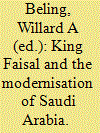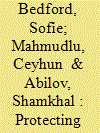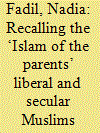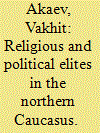|
|
|
Sort Order |
|
|
|
Items / Page
|
|
|
|
|
|
|
| Srl | Item |
| 1 |
ID:
025572


|
|
|
|
|
| Publication |
London, Croom Helm, 1980.
|
| Description |
253p.hbk
|
| Standard Number |
0709901372
|
|
|
|
|
|
|
|
|
|
|
|
Copies: C:1/I:0,R:0,Q:0
Circulation
| Accession# | Call# | Current Location | Status | Policy | Location |
| 018638 | 953.8/BEL 018638 | Main | On Shelf | General | |
|
|
|
|
| 2 |
ID:
178853


|
|
|
|
|
| Summary/Abstract |
The article contributes to a better understanding of ‘Traditional Islam’ (TI), a state-led project in Azerbaijan to establish an alternative narrative promoting a specific local understanding of Islam that builds on its non-political, non-sectarian and national features to prevent ‘non-traditional’ religious variants from gaining popular traction. The phenomenon has not appeared in a vacuum. First, its features and functions stem from Soviet-era anti-religious and nationalities policies. Second, many aspects of TI resemble counter-radicalisation initiatives worldwide. Finally, while introduced as a means of blocking radicalisation in order to protect Azerbaijan’s national identity as a secular state, Traditional Islam in fact works to extend state control over the religious domain and thus to prevent the development of any religiously grounded dissent against the authoritarian regime.
|
|
|
|
|
|
|
|
|
|
|
|
|
|
|
|
| 3 |
ID:
151747


|
|
|
|
|
| Summary/Abstract |
Scholarship on Islam in Europe has largely invested in examining the generational dynamics in the lived religious experiences of Muslims. Within this perspective, the idea of a generation gap, which revolves around a distinction between ‘tradition’ and ‘religion’, has figured as an important account in assessing some of these religious transformations. Drawing on fieldwork with Belgian Muslims of Moroccan origin, this paper seeks to nuance this perspective by exploring accounts wherein this ‘traditional’ Islam of the parents is actively reclaimed. This was especially the case for respondents who were quite critical of Islamic revivalist trends. In many of these stories, the parents’ Islam was understood as tolerant and open, in a way that was consonant with ‘tradition’. By focusing on these narratives, a first aim of the paper is to understand how genealogy and ancestry figure as distinct criteria in determining the ‘real Islam’. A second aim is to complicate the understanding of the liberal and modern self, and its relationship to the past.
|
|
|
|
|
|
|
|
|
|
|
|
|
|
|
|
| 4 |
ID:
134120


|
|
|
|
|
| Publication |
2014.
|
| Summary/Abstract |
This article highlights the main factors relating to the formation of the religious and political (Islamic) elites in the Northern Caucasus caused by Gorbachev's perestroika, the collapse of the Soviet Union, the reforms conducted in Russia, the creation of an ideological vacuum, and the birth of market relations. The sociocultural context that formed has given rise to an Islamic revival, the penetration of Salafi (Wahhabi) ideas into the region, and the formation of a neo-clergy that is not only claiming a leading role in the religious life of Muslims, but also active participation in politics, right down to preparing a state coup.
|
|
|
|
|
|
|
|
|
|
|
|
|
|
|
|
|
|
|
|
|